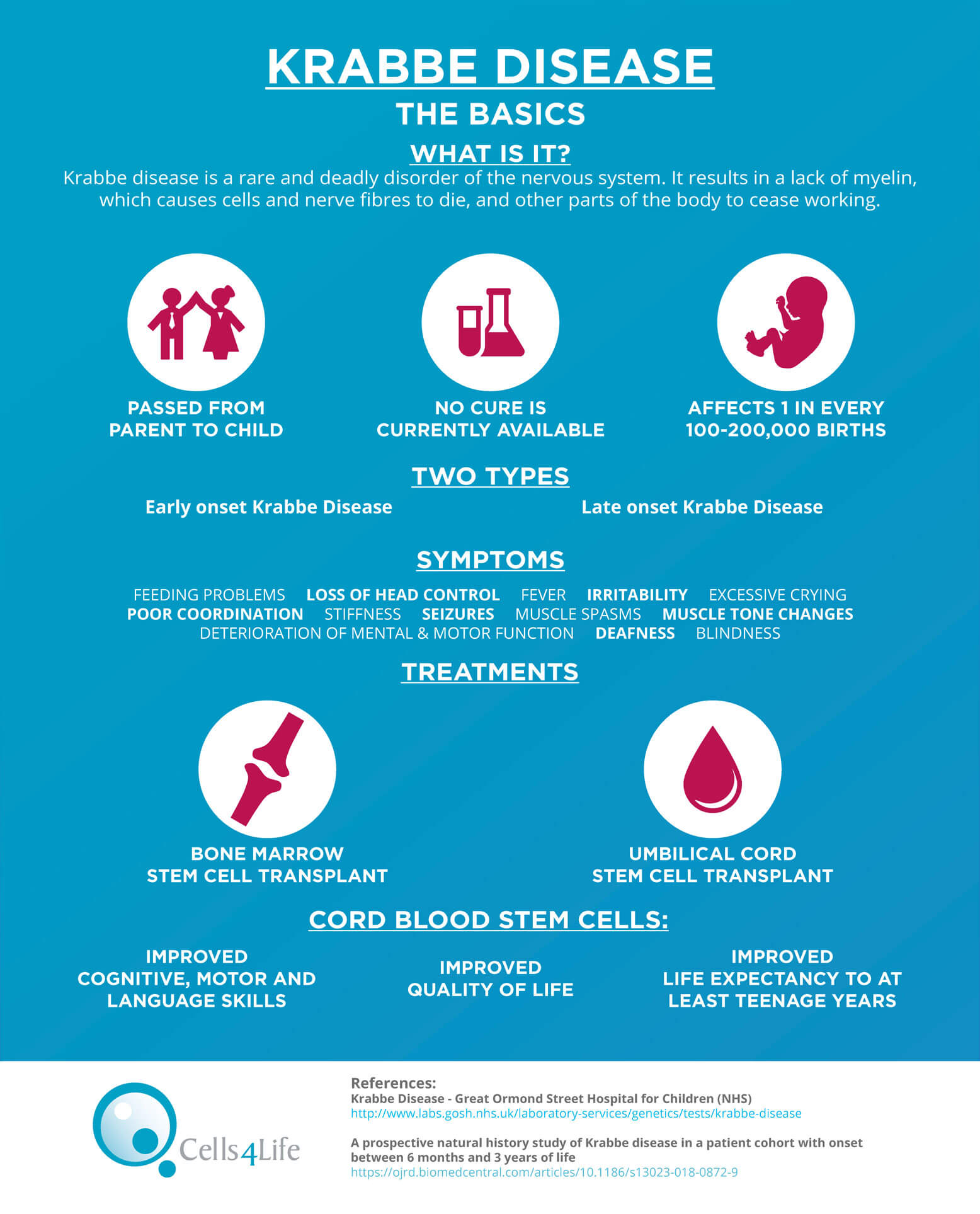How Cord Blood Transfusions Could Treat Krabbe Disease
09/01/2024

A new study published by the University of Pittsburgh School of Medicine suggests cord blood could extend the lives of children with Krabbe disease.
Research, led by Dr Maria Escolar, showed that cord blood transfusions not only improved life expectancy for patients, but also increased quality of life.
What is Krabbe disease?
Krabbe disease is a rare and deadly disorder of the nervous system. Patients with the condition have a defective gene in Chromosome 14, which results in a lack of protein called galactosylceramidase (GALC).
Normally, GALC helps to clear unneeded molecules out of cells and creates myelin. Myelin is used to coat and protect nerve fibres and without it, nerves and cells in the brain die – causing other parts of the body to cease working.
It is a genetic disorder inherited from parents and unfortunately, there is no cure.
There are two types of Krabbe disease:
Early onset Krabbe Disease
This form of the condition is diagnosed within the first six months of the baby’s life.
Symptoms include:
- Feeding problems
- Loss of head control
- Fevers
- Irritability and excessive crying
- Persistent vomiting
- Poor coordination
- Stiffness
- Seizures
- Muscle spasms
- Muscle tone changes
- Deterioration of mental/motor function
- Deafness/blindness
Late onset Krabbe Disease
This form of the condition is diagnosed when the child is between six months and three years old.
Symptoms include:
- Progressive loss of vision, leading to blindness
- Difficulty walking (ataxia)
- Poor hand coordination
- Muscle weakness/rigid muscles
- As well as many of the symptoms of early onset Krabbe Disease
What treatment options are available?
Treatment of Krabbe disease involves transplanting cells into the patient in order to compensate for the lack of GALC protein. Usually, this is done in one of two ways:
Bone marrow transplantation
Bone marrow transplantation replaces the patient’s bone marrow with a donor, in order to introduce healthy cells into the body which can cure the deficiencies which cause the disease.
These bone marrow cells are haematopoietic, which means they are blood forming. It is possible to reconstitute an entire blood system using bone marrow cells.
In the past, the best results have been seen in patients with late-onset Krabbe disease, before their more severe symptoms develop.
Cord blood transfusion
Cord blood transfusions use blood collected from the umbilical cord at the time of birth to introduce healthy cells into the patient’s blood system.
Unlike bone marrow transplantation, cord blood transfusions are more successful when they are delivered before symptoms appear.
“Our study provides evidence that the youngest babies who are at risk of developing the most severe form of Krabbe disease should be strongly considered for HSCT as soon as possible. HSCT, like all surgical procedures, does carry some risks so parents may be inclined to wait until Krabbe symptoms develop, but our findings suggest that may be too late for the best outcomes.”
Dr Maria Escolar
What did the trial involve?
Dr Escolar’s study treated 18 children with cord blood transfusions within 7 weeks of their birth.
Children were chosen based on a high risk of developing early-onset Krabbe disease, based on family history and genetic screening.
After transfusion, researchers followed the children’s progress for up to 15 years. This involved comprehensive annual evaluations of cognitive, speech and motor function, tests to determine the speed and strength of electrical signals from peripheral nerves, as well as brain imaging.
Intervention is most effective when done before symptoms appear and may help children live at least til their teens
What were the results?
In 2005, Dr Escolar’s research showed that haematopoietic stem cell transplants had at least three years of benefits.
This most recent study showed that early treatment of Krabbe disease with cord blood could improve quality of life and lead to longer lifespans.
The majority of the 18 children saw continued improvement in their motor, cognitive and language skills – even though these would usually degrade as the disease progresses.
10 of 18 children can now walk – two of whom can walk independently.







